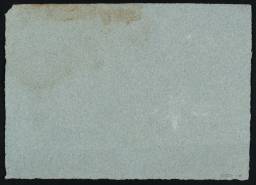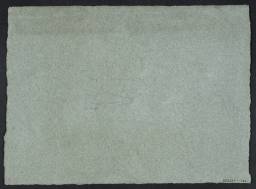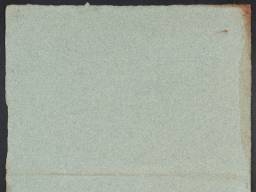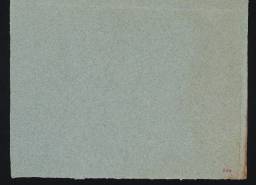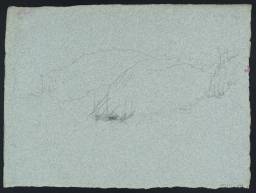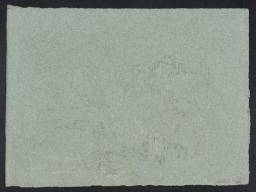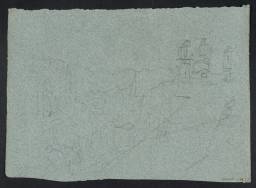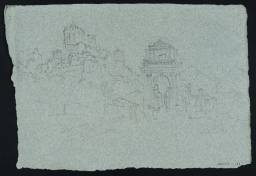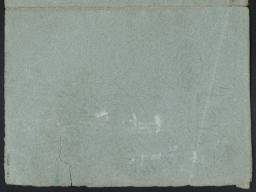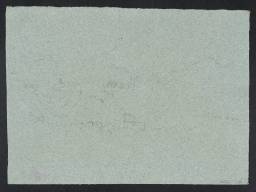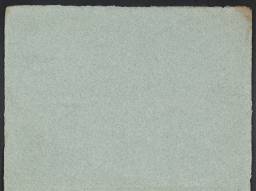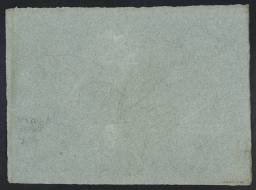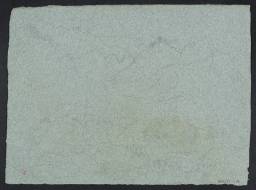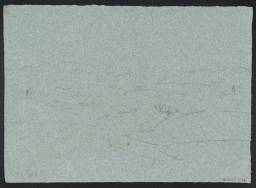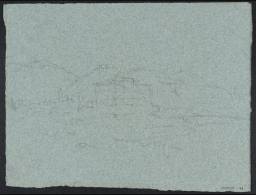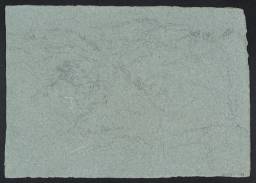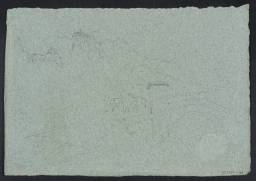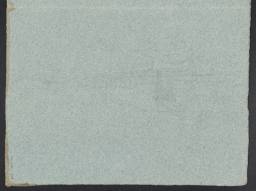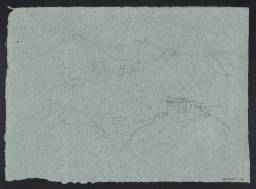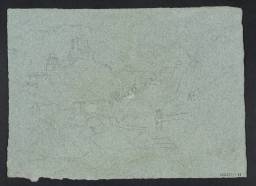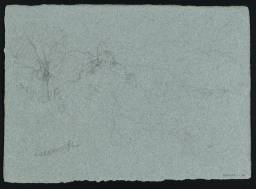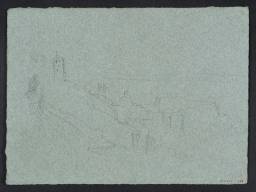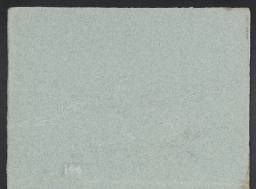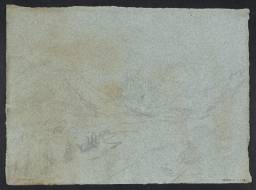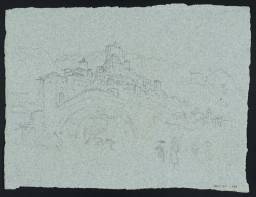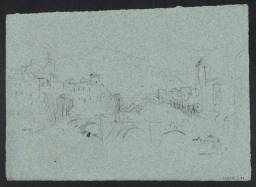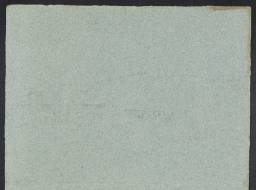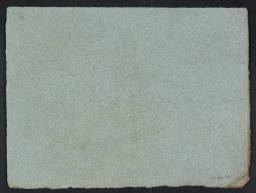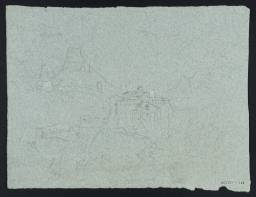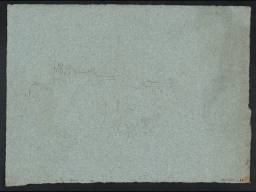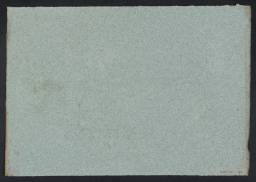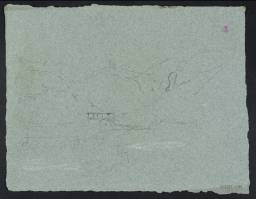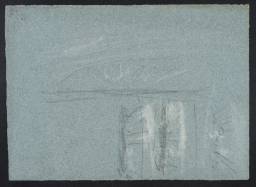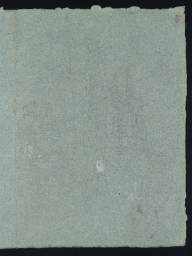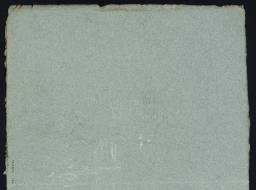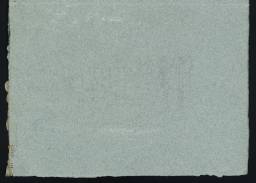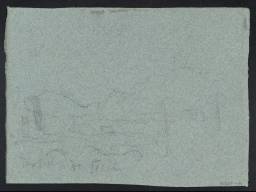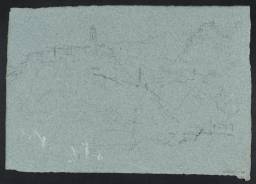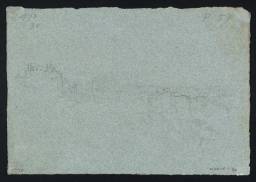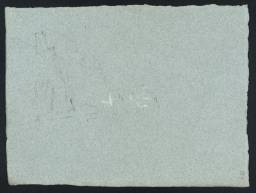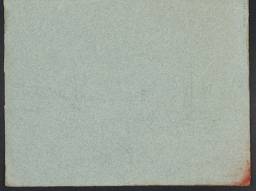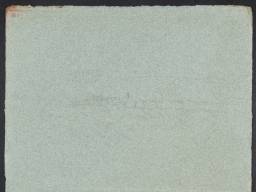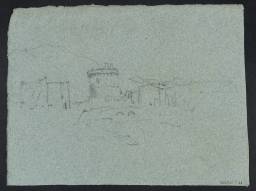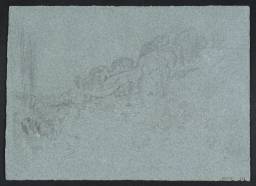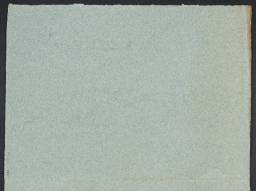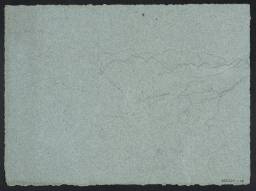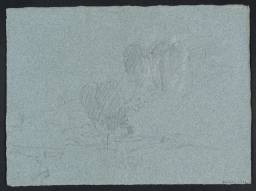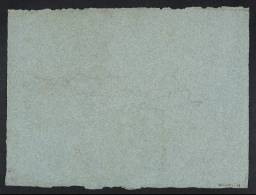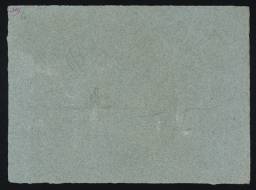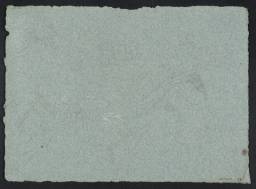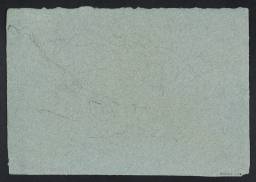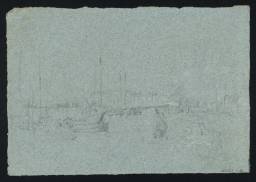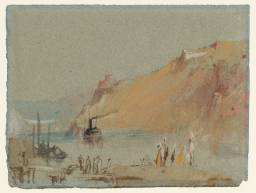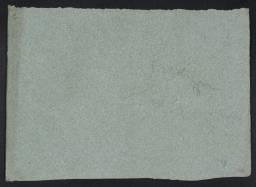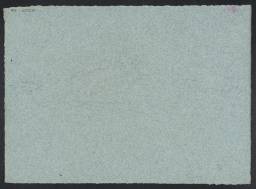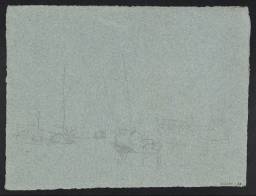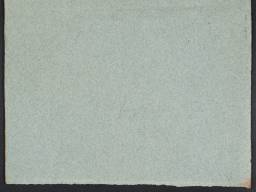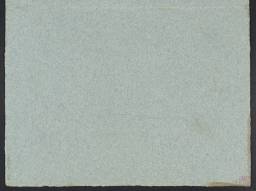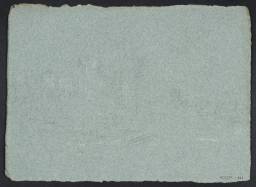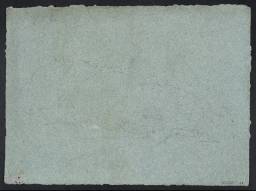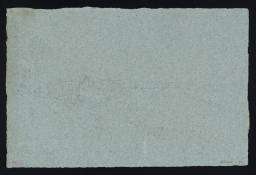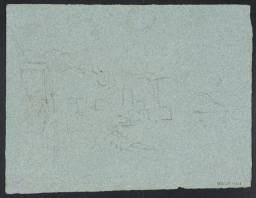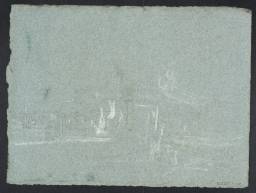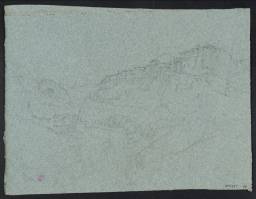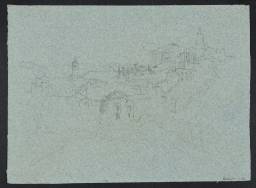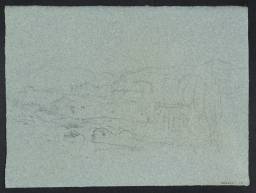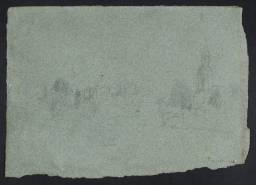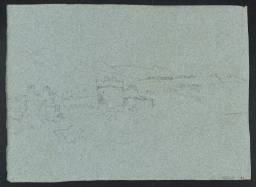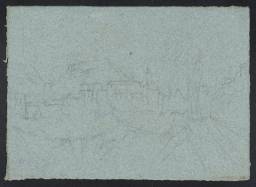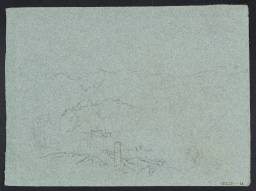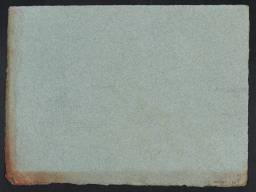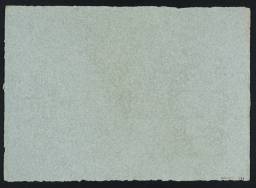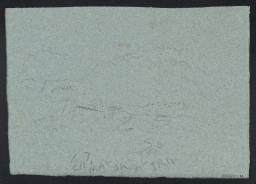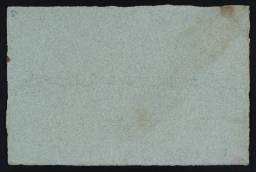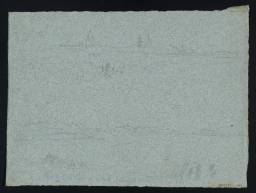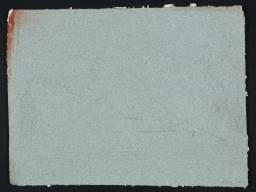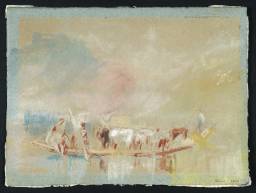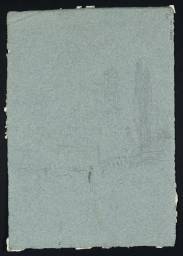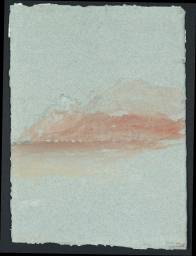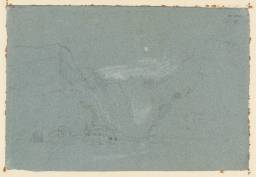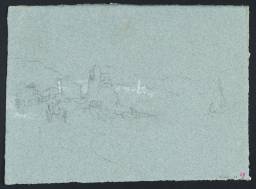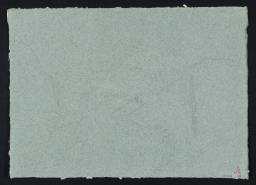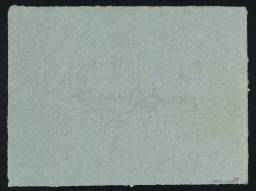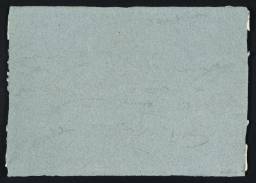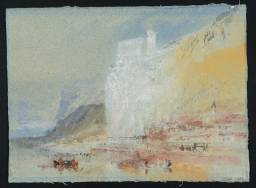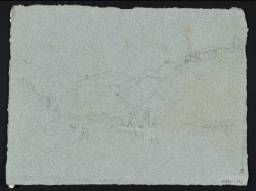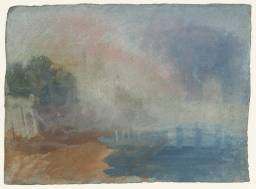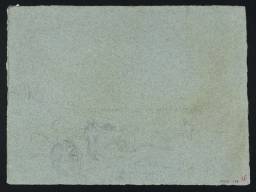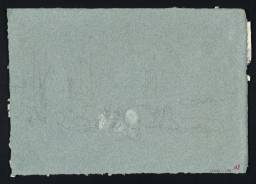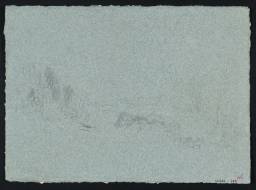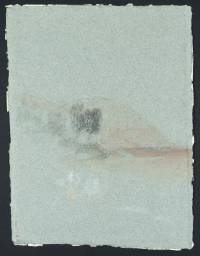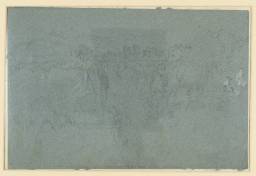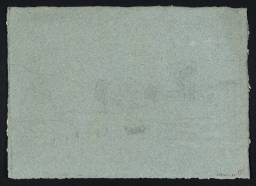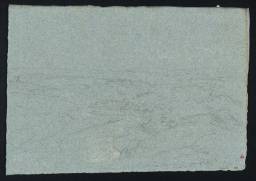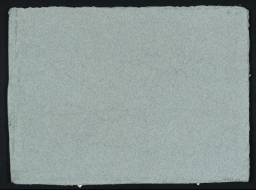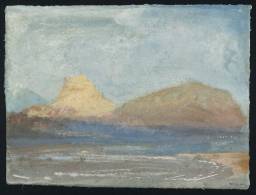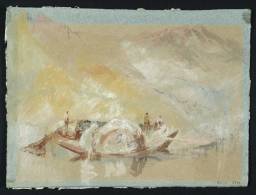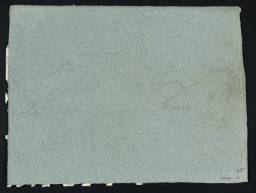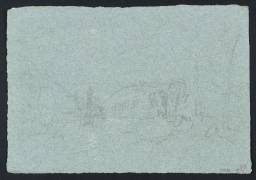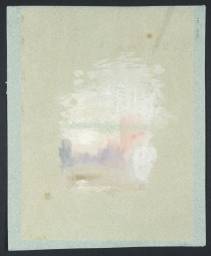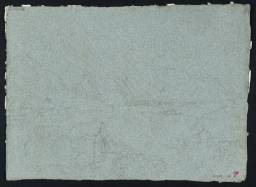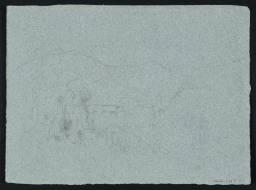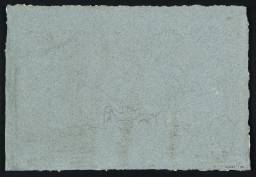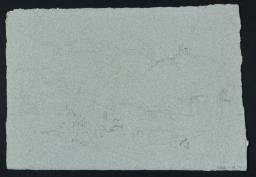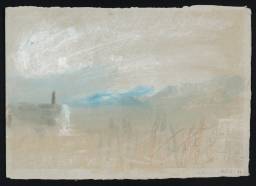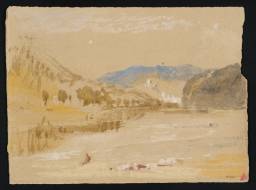European River and Lowland Scenes c.1824–39
From the entry
This section includes sketches of European river scenes by Turner in various combinations of pencil, chalk, watercolour and gouache on loose sheets of paper. The majority of these works are catalogued under the section of ‘Black and White Sketches on Blue Connected with the Meuse-Moselle Tour’ (Turner Bequest CCXXIV) in A.J. Finberg’s 1909 Inventory. All of the sketches in this rubric are on blue paper and belong to a much larger group of sheets, numbering well over a thousand, in the Turner Bequest, a group Gerald Wilkinson broadly described as a ‘sea of blue and grey papers, all the same size, with no dates.’ In the mid 1820s, while continuing to use sketchbooks of white paper, Turner adopted the practice of using small, neatly torn sheets of blue (or blue-grey) paper. The sketches on these sheets are worked in pencil, sometimes alone, but often with strong watercolour or gouache colours and/or white highlights in chalk or gouache; for further discussion, see the technical ...
D20276, D20321–D20322, D20324, D20327–D20330, D20335–D20336, D20338–D20340, D20342–D20344, D20346–D20347, D20350–D20351, D20353–D20358, D20360, D20366–D20367, D20369–D20374, D20377, D20379, D20388, D20390, D20398, D20401–D20402, D20411, D20416–D20418, D20420, D20434–D20435, D20441–D20444, D20452, D20456, D20459, D20463–D20465, D20500, D20508–D20510, D20533, D20545–D20549, D20551–D20554, D24605, D24609, D24613, D24618, D24722, D24813, D24829, D24973, D24977, D24985, D24995, D25001, D25006, D25017, D25028–D25029, D25032, D25045–D25046, D25057, D25062, D25069, D25078–D25080, D25090, D25122, D29005, D29013, D40413–D40414, D40081, D40120
Turner Bequest CCXXII Q, CCXXIV 30, 30v, 32, 35–38, 43–44, 46–47v, 49–50v, 52, 52v, 55–56, 58–63, 65, 71–72, 74–79, 81, 83, 92, 94, 102, 104–105v, 113, 117–119, 121, 134–134v, 140–142v, 150, 153, 155, 158–160, 191, 198–199v, 220, 230–233, 235–237, CCLIX 40, 44, 48, 53, 157, 248, 264, 264b, CCLXI 1, 5, 13, 23, 29, 34, 45, 56–57, 60, 73–74, 85, 90, 97, 106–108, 118, CCLXII 22, CCXCII 56, 62
Turner Bequest CCXXII Q, CCXXIV 30, 30v, 32, 35–38, 43–44, 46–47v, 49–50v, 52, 52v, 55–56, 58–63, 65, 71–72, 74–79, 81, 83, 92, 94, 102, 104–105v, 113, 117–119, 121, 134–134v, 140–142v, 150, 153, 155, 158–160, 191, 198–199v, 220, 230–233, 235–237, CCLIX 40, 44, 48, 53, 157, 248, 264, 264b, CCLXI 1, 5, 13, 23, 29, 34, 45, 56–57, 60, 73–74, 85, 90, 97, 106–108, 118, CCLXII 22, CCXCII 56, 62
This section includes sketches of European river scenes by Turner in various combinations of pencil, chalk, watercolour and gouache on loose sheets of paper. The majority of these works are catalogued under the section of ‘Black and White Sketches on Blue Connected with the Meuse-Moselle Tour’ (Turner Bequest CCXXIV) in A.J. Finberg’s 1909 Inventory.1 All of the sketches in this rubric are on blue paper and belong to a much larger group of sheets, numbering well over a thousand, in the Turner Bequest, a group Gerald Wilkinson broadly described as a ‘sea of blue and grey papers, all the same size, with no dates.’2
In the mid 1820s, while continuing to use sketchbooks of white paper, Turner adopted the practice of using small, neatly torn sheets of blue (or blue-grey) paper. The sketches on these sheets are worked in pencil, sometimes alone, but often with strong watercolour or gouache colours and/or white highlights in chalk or gouache; for further discussion, see the technical notes to the Introduction of the ‘House and Grounds at East Cowes Castle’, in Matthew Imms’s ‘Isle of Wight 1827’ section of the present catalogue. This practice continued until the Continental tours of 1839 and 1840.3
Prior to Finberg’s work in cataloguing these sketches, those within the range of Tate D20327–D20557 (Turner Bequest CCXXIV 35–240) had been held in either one of two bundles, containing works labelled by John Ruskin as ‘Scrawls’ and ‘Rubbish.’4 While many of them are faint and at first glance offer quite brief outlines of their subject, closer inspection of these modest works is often repaid with useful, sometimes fascinating, insights into Turner’s practice, certainly such as to challenge Ruskin’s disparaging assessment of them.
Turner twice toured the River Meuse, extending his journey along the river Moselle (before the Meuse-Moselle tours, he had toured the Meuse and Rhine in 1817). Following the course of these rivers would have taken him through parts of Belgium, north-eastern France and Luxembourg. In terms of when exactly these tours occurred, replacing Finberg’s date of 1826, Cecilia Powell’s proposition of 1824 for the first Meuse-Moselle tour is now generally accepted, as indeed is Powell’s view that the second Meuse-Moselle tour took place in 1839, rather than Finberg’s 1834.5
That the works listed under CCXXIV in the Inventory are given as from 1826 suggests Finberg considered this section largely composed of images from the first Meuse-Moselle tour. Similarly, the date of 1834 which he gives to drawings listed under ‘Water Colour Sketches Connected to the Meuse-Moselle-Rhine Tour, and Others’ (Turner Bequest CCXCII), two of which are included in this present section (D29005, D29013; CCXCII 56, 62), would seem to link these to the second Meuse-Moselle tour.6 While the overall range applied to this present section follows Powell’s more accurate dating of the tours, until more is known in terms of what geographical views the individual sketches depict, Finberg’s connection of sketches labelled Turner Bequest CCXXIV to the first Meuse-Moselle tour and those labelled CCXCII to the second Meuse-Moselle has been followed.
Other entries in this current section include sketches from Turner Bequest CCXXII, CCLIX, CCLXI and CCLXII. Of these, CCXXII lists twenty-six ‘Water Colours Connected with the Meuse-Moselle Tour’, as assessed by Finberg; CCLIX is ‘mostly connected with the ‘French Rivers’ series,’ although subjects from Belgium, the Rhine and even England are also likely to have been included; CCLXI presents views of France, possibly North Italy, while CCLXII includes subjects probably from France and possibly Great Yarmouth.’7
A.J. Finberg, A Complete Inventory of the Drawings of the Turner Bequest, London 1909, vol.II, pp.69–24.
Peter Bower, Turner’s Later Papers: A Study of the Manufacture, Selection and Use of His Drawing Papers 1820–1851, exhibition catalogue, Tate Gallery, London 1999, pp.88–113.
How to cite
Ben Pollitt, ‘European River and Lowland Scenes c.1824–39’, November 2019, in David Blayney Brown (ed.), J.M.W. Turner: Sketchbooks, Drawings and Watercolours, Tate Research Publication, August 2023, https://www

